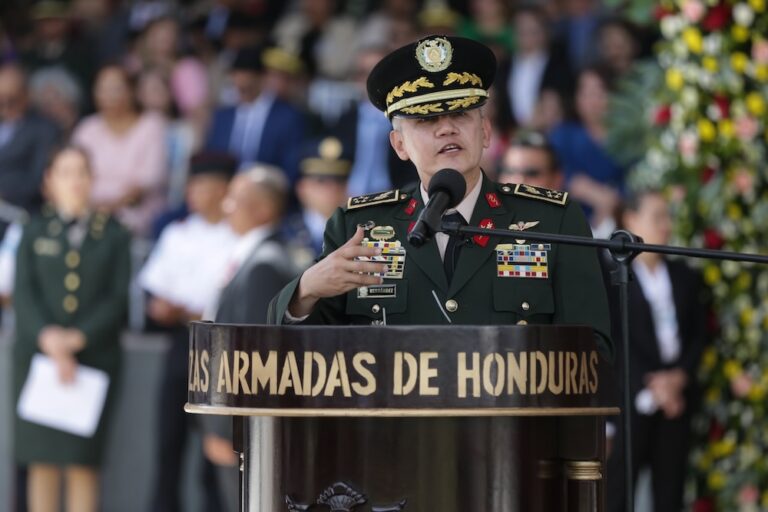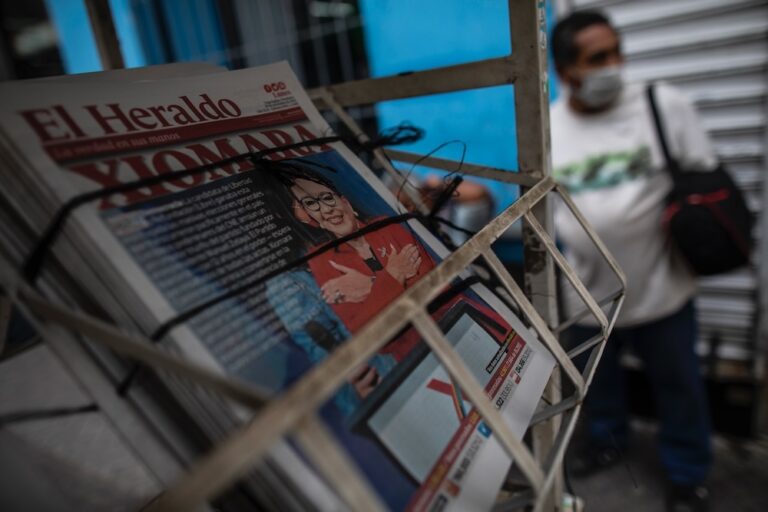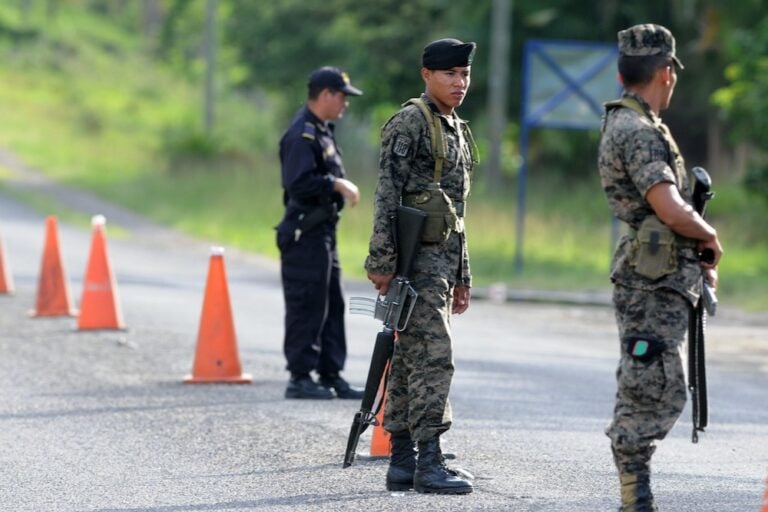PEN International talks to Honduran writer and former Interior Minister Victor Meza about the unintended gains of the 2009 coup for culture, creativity and resistance in Honduras.
This article was originally published on pen-international.org on 5 November 2014.
Currently Director of the Documentation Centre of Honduras (Centro de Documentación de Honduras – CEDOH www.cedoh.org), a think tank based in the Honduran capital Tegucigalpa, Meza was Minister of the Interior under former President José Manuel Zelaya, who was removed from power and forcibly deported in a coup d’état on 28 June 2009. More recently, Meza was coordinator of the Public Security Reform Commission (Comisión de Reforma a la Seguridad Publica – CRSP), charged with weeding out corruption in the security forces and justice system following the coup until the Commission was disbanded in March 2014, one year short of its minimum three-year mandate.
Meza spoke to Tamsin Mitchell, PEN International’s Americas Researcher, about the unwitting currents of change in Honduras’ cultural and political environment following the coup.
To read PEN International’s joint shadow report to the United Nations on freedom of expression and the cultural sector in Honduras click here.
To read about the new PEN Centre in Honduras click here.
“Culture is the Cinderella of the Honduran national budget. No government in recent years has really been interested in the world of culture – it’s a secondary theme here. Culture has fewer resources than any of the other ministries and now it’s been downgraded to a directorate. The state and the political class don’t value culture; it’s not an important element in national public life. It’s sad but that’s how it is. The importance of cultural life depends a lot on the Minister who is appointed, if it’s someone sensitive, intelligent. If so, things are better – but there is still the problem of the budget.
“From 1994 to 1998 the Minister of Culture was Dr Rodolfo Pastor Fasquelle and this was a positive period for cultural policy in Honduras. He took up this work again when he was appointed Minister of Culture for a second time under [former President] Zelaya [in 2006]. But this improvement was more as a result of Pastor as an individual and his personality, not government policy. Almost no government has really been interested in developing a “cultural policy”. Culture should have more importance in a modern and democratic society. The political class is not interested, it’s [seen as something] more [for] intellectuals.
“Until five years ago, the Honduran intelligentsia was less involved in politics than anywhere else in Central America. This is not true now. The period since the coup has been one of the most important culturally speaking. Increasingly intellectuals have become involved in the movement resisting the coup; they have accepted a commitment to the need for social change.
“Honduras has never been strong intellectually speaking when compared to the rest of Central America: it didn’t have the revolutionary movements that the other countries had; it had no strong and independent leftwing like Guatemala, Nicaragua and El Salvador. Of the best intellectuals in Honduras of the 20th century, only one or two was truly politically engaged, and only one Honduran intellectual was imprisoned for his ideas: the poet Pompeyo del Valle, who was the director of a clandestine newspaper and a Communist militant leader. By contrast numerous intellectuals were imprisoned, killed and exiled in Nicaragua, Guatemala and El Salvador.
“So the importance of the coup in Honduras is that it has brought about a change in this situation and opened doors to intellectuals, poets, painters and musicians in terms of resistance. I was surprised when I saw young painters after the coup spraying graffiti on walls, musicians singing songs with the people, poets writing about the resistance. It was the first time I had seen something like that happen here.
“I compare the [post-coup] resistance to the spontaneous rebellions of May 1968 in France – bearing in mind, obviously, the differences in the case and historical period. The movement’s leadership, still caught in the web of the Cold War, didn’t fully understand the new nature of the social movement, its creative imagination, its marvellous spontaneity, pluralism and ideological anti-dogmatism. The coup was the confluence of a point of arrival and departure. Here [at the Honduran Centre of Documentation] we’ve analysed the political, social and economic impact of the coup on Honduras – but not its impact on culture. This is a deficit of scientific research. We need to look at the impact on people’s minds – this is a challenge we need to meet.
“The coup came about because the elites were afraid of the call to social mobilization made by President Zelaya in the last phase of his mandate. Zelaya wanted a new Constitution because the current one – designed in another era, more than three decades ago – no longer met the urgent needs of Honduran society today nor did it allow for its new political and social dynamics. The Constitution had become an obstacle to the changes that the country requires. The business, political, religious and military elites were afraid of the new currents of social inclusion that Zelaya, voluntarily or involuntarily, awakened and stimulated in the national community.
“At the time of the coup I was the Minister of Governance and Justice (now known as the Minister of the Interior) and had access to privileged information. So I can say that the coup was prepared on the hoof, it was not very well organized and there was no ability to predict its consequences. It was what we call a golpe light (coup light), since no one expected that it would translate into an extended period of power on the part of the military. The army was just a tool: it did not have a planning or organizational role. The real conspirators were hidden within the country’s political and business elites.
“But this coup, poorly prepared and badly executed as it was, paradoxically allowed the country to take a leap forward, to turn people against militarism in favour of change and transformation. The coup resulted in significant cultural, positive and necessary changes in the collective mind of the majority of Hondurans, particularly among young people and women.
“For example:
1. The golpistas [organisers/ promoters of the coup] said they overthrew the elected government in order to save democracy. But in fact they destroyed the little democracy we had constructed in 30 years. The two-party system which had existed for 100 years worked to preserve the elites. The coup broke this bipartisan balance and brought a healthy chaos to the political and party systems.
2. The golpistas say they did it to save the political parties because Zelaya wanted to destroy them. But in fact the coup weakened the old parties and created the conditions for new options to emerge, such as Liberty and Refoundation (Libertad y Refundación – LIBRE) and the Anti-Corruption Party (Partido Anticorrupción – PAC), which are now the second and fourth political forces in the country respectively. So what happened was exactly the opposite of what the golpistas wanted.
3. They said they did it to protect the large media outlets because Zelaya wanted to weaken them. But the opposite has occurred: the migration of audiences from the main radio and TV outlets to alternative media. Many outlets seen as small or regional in fact now have larger audiences than the mainstream media.
4. They said they did it to stop [Hugo] Chávez, that they would openly “fight” him. But they ended up fighting with the whole world, including Barack Obama, who personally condemned the breakdown of constitutional order.
“So the coup was a total failure. I took part in the negotiations with the golpistas as a representative of President Zelaya to reverse the coup and seek a proper political solution to the crisis. During these talks I told the golpistas that the coup was a historical fiasco in terms of concrete results. It did not achieve any of its strategic objectives. In the end, it resulted in a population that is less controllable, more critical and more demanding. It also produced what we have today: the country with the worst crime rates in the Americas, with more poverty and less democracy. These are the lessons of the coup.
“I once wrote that that Honduras needs, and is entitled to, a new right-wing because the one we currently have, or put up with, is archaic and unrefined, a traditional Nineteenth Century right-wing. It’s not of our time, it’s trapped in the past. It lacks enlightenment and modernity. It’s a hollow right-wing, incapable of positive dialogue and mutual understanding. It lacks tolerance and flexibility. There’s also a certain section of the left that is equally backward and stuck in old dogmas and prejudices. The country needs new life, ideological freshness and new ways of thinking. The coup unwittingly generated currents of change in Honduras’ cultural and political environment.
“I’m happier with society now than I was before the coup: there is more critical spirit, political energy, social participation and a renewed interest in politics. This is a new phenomenon in Honduras (not in Latin America): the rejection of traditional politicians but not of politics itself.
“In terms of freedom of expression, people in Honduras are more critical now but the state is more interested in controlling freedom of thought. The coup strengthened the state’s authoritarian tendencies. There has been a resurgence of militarisation in Honduras which has caused the human rights situation to deteriorate and which has limited freedom of expression.
“In other words, in a strange dialectical circle, our country has advanced culturally and politically since the coup, but at the same time it has regressed in terms of human rights, civil liberties and freedom of thought. Advances and setbacks are the contradictory dynamics of post-coup Honduras.”
To read PEN International’s joint shadow report to the United Nations on freedom of expression and the cultural sector in Honduras click here.
To read about the new PEN Centre in Honduras click here.
Read the Spanish here.


